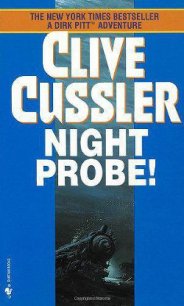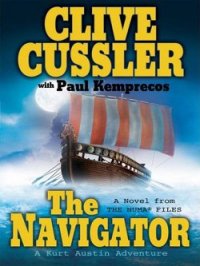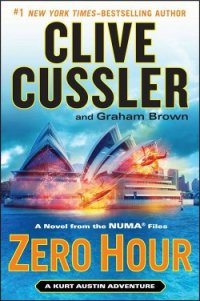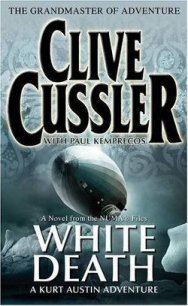Inca Gold - Cussler Clive (читать онлайн полную книгу .TXT) 📗
Shannon's heart fluttered and she gripped the handrail until her knuckles turned ivory.
"Good news?" asked Pitt.
She opened her mouth, but no sound came out. She looked stunned.
Pitt put his arm around her waist to support her. "Are you all right?"
"The Golden Body Suit of Tiapollo," she murmured reverently, "was lost to the world in a daring robbery at the Museo Nacional de Antropologia in Seville in 1922. There isn't an archaeologist alive who wouldn't sign away his or her pension to study it."
"What exactly makes it so special?" asked Stewart.
"It is considered the most prized artifact to ever come out of South America because of its historic significance," Shannon lectured, as if entranced. "The gold casing covered the mummy of a great Chachapoyan general known as Naymlap, from the toes to the top of the head. The Spanish conquerors discovered Naymlap's tomb in 1547 in a city called Tiapollo high in the mountains. The event was recorded in two early documents but today Tiapollo's precise location is unknown. I've only seen old black-and-white photos of the suit, but you could tell that the intricately hammered metalwork was breathtaking. The iconography, the traditional images, and the designs on the exterior were lavishly sophisticated and formed a pictorial record of a legendary event."
"Picture writing, as in Egyptian hieroglyphics?" asked Pitt.
"Very similar."
"What we might call an illustrated comic strip," added Giordino as he stepped out on deck.
Shannon laughed. "Only without the panels. The panels were never fully deciphered. The obscure references seem to indicate a long journey by boat to a place somewhere beyond the empire of the Aztecs."
"For what purpose?" asked Stewart.
"To hide a vast royal treasure that belonged to Huascar, an Inca king who was captured in battle and murdered by his brother Atahualpa, who was in turn executed by the Spanish conqueror Francisco Pizarro. Huascar possessed a sacred gold chain that was two hundred and fourteen meters long. One report given to the Spaniards by Incas claimed that two hundred men could scarcely lift it."
"Roughly figuring that each man hoisted sixty percent of his weight," mused Giordino, "you're talking over nine thousand kilograms or twenty thousand pounds of gold. Multiply that by twelve troy ounces . . ."
"And you get two hundred and forty thousand ounces," Pitt helped out. Giordino's calculating expression suddenly crumbled into blank astonishment. "Oh my God. On today's gold market that works out to well over a hundred million dollars."
"That can't be right," scoffed Stewart.
"Compute it for yourself," muttered Giordino, still stupefied.
Stewart did, and his face went as blank as Giordino's. "Mother of heaven, he's right."
Shannon nodded. "That's just the price of the gold. As an artifact it is priceless."
"The Spanish never got their hands on it?" Pitt asked Shannon.
"No, along with a vast hoard of other royal wealth, the chain disappeared. You've probably all heard the story of how Huascar's brother Atahualpa tried to buy his freedom from Pizarro and his conquistadors by offering to fill a room that measured seven meters in length by five meters wide with gold. Atahualpa stood on his tiptoes, reached up and drew a line around the room that was almost three meters from the floor, the height to which the gold would top out. Another smaller room nearby was to be filled with silver twice over."
"Has to be a world's record for ransom," mused Stewart.
According to the legend," Shannon continued, "Atahualpa seized massive numbers of golden objects from palaces, religious temples, and public buildings. But the supply was coming up short, so he went after his brother's treasures. Huascar's agents warned him of the situation, and he conspired to have his kingdom's treasures spirited away before Atahualpa and Pizarro could get their hands on them. Guarded by loyal Chachapoyan warriors, commanded by General Naymlap, untold tons of gold and silver objects, along with the chain, were secretly transported by a huge human train to the coast, where they were loaded on board a fleet of reed and balsa rafts that sailed toward an unknown destination far to the north."
"Is there any factual basis to the story?" Pitt asked.
"Between the years 1546 and 1568, a Jesuit historian and translator, Bishop Juan de Avila, recorded many mythical accounts of early Peruvian cultures. While attempting to convert the Chachapoyan people to Christianity, he was told four different stories about a great treasure belonging to the Inca kingdom that their ancestors helped carry across the sea to an island far beyond the land of the Aztecs, where it was buried. Supposedly it is guarded by a winged jaguar until the day the Incas return and retake their kingdom in Peru."
"There must be a hundred coastal islands between here and California," said Stewart.
Shannon followed Pitt's gaze down to the restless sea. "There is, or I should say was, another source of the legend."
"All right," said Pitt, "let's hear it."
"When the Bishop was questioning the Cloud People, as the Chachapoyans were called, one of the tales centered on a jade box containing a detailed chronicle of the voyage."
"An animal skin painted with symbolic pictographs?"
"No, a quipu," Shannon replied softly.
Stewart tilted his head quizzically. "A what?"
"Quipu, an Inca system for working out mathematical problems and for record keeping. Quite ingenious, really. It was a kind of ancient computer using colored strands of string or hemp with knots placed at different intervals. The various color-coded strands signified different things -blue for religion, red for the king, gray for places and cities, green for people, and so forth. A yellow thread could indicate gold while a white one referred to silver. The placement of knots signified numbers, such as the passage of time. In the hands of a quipu-mayoc, a secretary or clerk, the possibilities of creating everything from records of events to warehouse inventories were endless. Unfortunately, most all the quipus, one of the most detailed statistical records of a people's history ever kept, were destroyed during the Spanish conquest and the oppression that followed."
Pitt said, "And this stringed instrument, if you'll forgive the pun, was used to give an account of the voyage, including time, distances, and location?"
"That was the idea," Shannon agreed.
"Any clues as to whatever became of the jade box?"
"One story claims the Spaniards found the box with its quipu and not knowing its value, sent it to Spain. But during shipment aboard a treasure galleon bound for Panama, the box, along with a cargo of precious artifacts and a great treasure of gold and silver, was captured by the English sea hawk, Sir Francis Drake."
Pitt turned and regarded her as he might a classic automobile he'd never seen before. "The Chachapoyan treasure map went to England?"
Shannon gave a helpless shrug. "Drake never mentioned the jade box or its contents when he reached England after his epic voyage around the world. Since then, the map has become known as the Drake quipu, but it was never seen again."
"A hell of a tale," Pitt muttered quietly. His eyes seemed to turn dreamlike as his mind visualized something beyond the horizon. "But the best part is yet to come."




